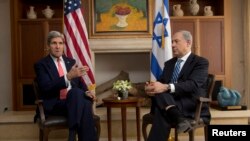BETHLEHEM —
U.S. Secretary of State John Kerry said good faith and serious efforts are required from both Israelis and Palestinians to bring about a two-state solution following separate meetings Wednesday with Israeli Prime Minister Benjamin Netanyahu and Palestinian President Mahmoud Abbas.
Three months into what is scheduled to be nine months of peace talks, Kerry expressed confidence that both sides have the ability to make progress.
"So I hope that we will continue in the good faith that brought the parties together in the first place," he said, declaring, "This can be achieved."
But there has been little apparent progress toward a two-state solution.
Israel has freed some Palestinian prisoners, which U.S. officials say is an encouraging step forward. But Israel is also moving ahead with more settlements, which U.S. officials say "do not create a positive environment for negotiations."
Netanyahu told Kerry that Israel wants peace and Palestinians are the ones delaying an agreement.
"I'm concerned about their progress because I see the Palestinians continuing with incitement, continuing to create artificial crises, continuing to avoid and run away from the historic decisions that are needed to make a genuine peace," Netanyahu said. "I hope that your visit can help steer back to a place where we could achieve historical peace that we seek and that our people deserve."
Abbas did not speak to reporters following his meeting with Kerry.
But Palestinian negotiators say besides the issue of settlements, Israel is also blocking progress on water rights and the exchange of land in a two-state solution that is to be decided beyond Israel's pre-1967 borders.
The scale of new Israeli settlements has put President Abbas under considerable domestic pressure, including allegations that he agreed to the new construction as part of these talks. Kerry flatly denied them.
"I want to make it extremely clear that at no time did the Palestinians in any way agree as a matter of going back to the talks that they somehow condone or accept the settlements," said Kerry.
He added the Palestinians believe the settlements are illegal, and the United States believes they are illegitimate.
"That is not to say that they weren't aware or we weren't aware that there would be construction. But that construction importantly, in our judgment, would be much better off limited as much as possible in an effort to help create a climate for these talks to proceed effectively," he said.
During his meeting with Netanyahu, Kerry also discussed Iran's nuclear program and again promised that the United States will not allow Iran to develop atomic weapons.
Iran says its nuclear program is only for peaceful civilian purposes and it is meeting with international mediators in Geneva this week in hopes of easing crippling economic sanctions imposed over suspicions about its atomic ambitions.
Netanyahu told Kerry that he would be very wary of any partial deals that enable Iran to maintain its capacity to enrich uranium and develop weapons while beginning to reduce sanctions.
Kerry meets again with Abbas in Jordan Thursday following dinner Wednesday with Netanyahu.
Three months into what is scheduled to be nine months of peace talks, Kerry expressed confidence that both sides have the ability to make progress.
"So I hope that we will continue in the good faith that brought the parties together in the first place," he said, declaring, "This can be achieved."
But there has been little apparent progress toward a two-state solution.
Israel has freed some Palestinian prisoners, which U.S. officials say is an encouraging step forward. But Israel is also moving ahead with more settlements, which U.S. officials say "do not create a positive environment for negotiations."
Netanyahu told Kerry that Israel wants peace and Palestinians are the ones delaying an agreement.
"I'm concerned about their progress because I see the Palestinians continuing with incitement, continuing to create artificial crises, continuing to avoid and run away from the historic decisions that are needed to make a genuine peace," Netanyahu said. "I hope that your visit can help steer back to a place where we could achieve historical peace that we seek and that our people deserve."
Abbas did not speak to reporters following his meeting with Kerry.
But Palestinian negotiators say besides the issue of settlements, Israel is also blocking progress on water rights and the exchange of land in a two-state solution that is to be decided beyond Israel's pre-1967 borders.
The scale of new Israeli settlements has put President Abbas under considerable domestic pressure, including allegations that he agreed to the new construction as part of these talks. Kerry flatly denied them.
"I want to make it extremely clear that at no time did the Palestinians in any way agree as a matter of going back to the talks that they somehow condone or accept the settlements," said Kerry.
He added the Palestinians believe the settlements are illegal, and the United States believes they are illegitimate.
"That is not to say that they weren't aware or we weren't aware that there would be construction. But that construction importantly, in our judgment, would be much better off limited as much as possible in an effort to help create a climate for these talks to proceed effectively," he said.
During his meeting with Netanyahu, Kerry also discussed Iran's nuclear program and again promised that the United States will not allow Iran to develop atomic weapons.
Iran says its nuclear program is only for peaceful civilian purposes and it is meeting with international mediators in Geneva this week in hopes of easing crippling economic sanctions imposed over suspicions about its atomic ambitions.
Netanyahu told Kerry that he would be very wary of any partial deals that enable Iran to maintain its capacity to enrich uranium and develop weapons while beginning to reduce sanctions.
Kerry meets again with Abbas in Jordan Thursday following dinner Wednesday with Netanyahu.













